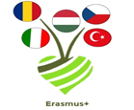Partners agreed on the following issues:
The project ECOART is created with the idea of using art as a catalyst for students and teachers to focus on environmental challenges and sensitize them to the damage caused by natural disasters and climate change as well as to organize exhibitions, artistic and cultural events.
ECOART brings together photography, storytelling and environmental issues to raise awareness about the topic with the power of arts and improve the creativity of young people and develop skills with non-formal educational tools and active participation methods.
A) The environmental groups are student-led initiatives that will make action plans for climate change mitigation in their schools-organizations, and share experiences with international project group. They will create photo libraries, shoot short films and create digital magazines.
B) Project „outcomes“ are a. Project website b. EcoArt online booklet including info about the project, about the partners, techniques used on digital photography during C1, Techniques used on digital storytelling during C2, Techniques used on social media training during C3, Info about other workshops related to environment during the project lifecycle; Results of surveys conducted; Notes from participants . c. EcoArt digital photo library – 1 by each organization d. EcoArt Documentary videos – 3 by each partner e. Story telling videos oF endangered animals and plants f. A social media campaign where all products created by students -personal stories – experiences are presented for awareness raising. g. 5 newsletters h. project magazines i. 1 Exhibition j. 6 mulitiplier events
C) Teachers and youth-workers will organize a Multiplier event in month 23 to share project results. Evidence of participants will be ensured.
D) Partners will include local authorities working on environmental issues and cooperate with art organisations.
E) Each partner will include 5 disadvantaged LTTA participants. All LTTA participants will +be involved in planning, implementing and evaluating their own contribution to the LTTA.
F) Each partner will organise information sessions and encourage direct participants to share the information with their peers. The sending organisations will involve young target group people.
G) Europeans, z.s. with İ.ova Genclik -TR will lead the activities related to the validation of the learning process, developing tools and monitoring the activities.
H) Each partner will organize informal sessions and encourage direct participants to share the information among their peers.
I) Project management tools will be prepared: SWOT analysis of the project, WBS, OBS, CBS, GANTT, Risk Matrix, etc.).
J) Erasmus+ project corners
K) Dissemination in local media and with stakeholders
L) Project logo contest
M) Questionnaires will be applied on the pupils to see their interest and knowledge about on climate change and environmental issues. (Tests will be applied in the beginning of the project and at the project end.)
N) Survey to understand participants‘ expectations of the project and If they are satisfied with the results in the end.
O) Meeting with all parents and students involved in order to explain and answer all questions that will rise through the implementation of the project and the mobility.
P) Project will be advertised, putting a lot emphasis on the European answer, on the financing thanks to the Erasmus+ programme and the National Agency part with a presentation press conference and realization of paper documents.
Q) Turkish and Czech teams create the Quality manual. A quality report will be prepared including dissemination and evaluation activities
R) Reports of implemented activities every 4 months. The first one at the beginning of July to be able to create a report for the Czech NA and ask for the second payment.
S) Number of external participants in the project will be documented, proof will be ensured.
T) A video call every two months. The next one will be prior the LTTA in Turkey.
U) E-Twinning page will be created asap. (Aydinkent responsible)
V) All partners have to prove how many young people, local participants and cooperating organisations participated in the project implementation activities.
W) Coordinator insures announcement of the project approval on local media.
